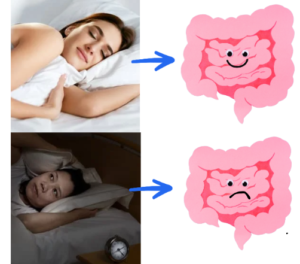Exploring the Essential Link Between Quality Sleep and Digestive Wellness
Sleep is far more than just a period of rest; it is a vital biological function that significantly influences our digestive health. The complex interplay between sleep and digestion encompasses numerous physiological processes that operate in harmony. The body’s circadian rhythm, often described as the internal biological clock, regulates both sleep cycles and digestive processes. This synchronisation is evident as individuals often feel hunger at regular intervals throughout the day, showcasing the body’s remarkable ability to operate in tune with its natural biological rhythms.
Maximising Digestive Health Through Restorative Sleep Practices 
Sleep is crucial for the body’s capacity to heal, rejuvenate, and restore its various systems. The deeper stages of sleep are especially important for these restorative functions. During these profound phases, the organs, tissues, and cells that make up the digestive system not only relax but also undergo essential repair processes. The body prioritises cellular repair and growth during deep sleep, particularly regarding the regeneration of the cells that line the digestive tract. These cells face constant wear and tear due to exposure to food particles and digestive enzymes, making their timely regeneration vital for maintaining the integrity of the gastrointestinal lining. This, in turn, enhances the effectiveness of digestion.
Deep sleep also plays a significant role in fortifying the immune system, which is particularly crucial for the digestive system as it houses specialised immune cells activated by the beneficial bacteria residing in the gut. These immune cells are vital for protecting the gut and the entire digestive system from harmful microorganisms, thus ensuring a balanced population of bacteria within the gut ecosystem.
Additionally, the organs within the digestive system are crucial for detoxification, helping to eliminate waste and harmful substances from the body. Deep sleep enhances this detoxification process by optimising the functioning of the liver and kidneys, enabling these organs to perform at their peak efficiency. The synergistic relationship between sleep and detoxification is a fundamental element in promoting overall digestive health and wellness.
Unravelling the Connection Between Gut Motility and Sleep Patterns
A core element of digestion is the efficient movement of food and waste through the digestive tract, a process known as gut motility. This process experiences notable changes during sleep. Throughout both deep and light sleep, the rate of gut motility significantly decreases. This reduction is a necessary adaptation, allowing the digestive system to conserve energy, which can then be redirected towards repairing digestive tissues. By conserving energy in this way, the digestive process is primed to function more effectively during waking hours, optimising both nutrient absorption and waste elimination.
The migrating motor complex represents a series of contractions that occur during fasting periods, including during sleep. This cycle is vital for gut motility, as it effectively removes food particles and residue that may linger in the digestive system. This natural cleansing mechanism of the digestive tract reduces the risks of bacterial overgrowth, fostering a healthy gut environment. Notably, the migrating motor complex is most actively engaged during the night when individuals are fasting and asleep, highlighting the critical role of sleep in sustaining the health of the digestive system.
As the day begins, gut motility gradually increases, preparing the digestive system to efficiently process and digest food. This rise in motility can also trigger the first bowel movement of the day, illustrating the finely tuned relationship between sleep and gut motility. Understanding this connection is essential for optimising digestive health and enhancing overall well-being.
Examining Hormonal Interactions That Impact Sleep and Digestion
Ghrelin, often referred to as the hunger hormone, plays a crucial role in stimulating appetite. In contrast, leptin informs the brain that the stomach is full, helping to prevent overeating. Together, these hormones are fundamental to appetite regulation; however, their functions can be adversely affected by inadequate sleep.
Even a single night of insufficient sleep can lead to elevated levels of ghrelin, which can increase appetite and commonly trigger cravings for carbohydrates. This phenomenon is often described as feeling ‘hangry’. Adding to this challenge, leptin levels may decline following a night of poor sleep, disrupting signals that indicate satiety. This creates a complicated situation where individuals may overeat and struggle to recognise their body's signals to stop eating. While occasional poor sleep may not have severe repercussions, chronic insomnia can lead to substantial digestive issues, including gut inflammation, liver disorders, gastroesophageal reflux disease, inflammatory bowel disease, and even colorectal cancer, along with contributing to weight gain.
Exploring the Consequences of Sleep Disruption on Digestive Health
Disruptions to sleep can lead to a variety of digestive issues. Factors such as shift work, particularly night shifts, and experiencing jet lag can significantly disrupt sleep patterns and disturb the body’s internal clock. Moreover, late-night eating or irregular meal timings can negatively impact the quality of sleep. The circadian rhythm governing sleep is intrinsically linked to natural sunlight, which is crucial for maintaining a healthy sleep-wake cycle.
Unfortunately, in today’s technology-driven world, many individuals spend the majority of their daytime indoors, resulting in reduced exposure to natural light. This shift has led to an increase in exposure to blue light emitted by devices such as laptops, televisions, and smartphones, further disrupting the sleep cycle and sleep patterns, especially when this exposure occurs shortly before bedtime.
The cumulative effects of these factors can result in serious digestive issues, including diarrhoea, ulcers, inflammatory bowel disease, or disturbances in the delicate balance between beneficial and pathogenic bacteria in the gut. This imbalance can also compromise the integrity of the gut lining, exacerbating challenges related to digestive health.
Improving Microbiome Health Through Quality Sleep Habits
The microbiome consists of the trillions of microorganisms residing in the gut, primarily comprised of beneficial bacteria known as probiotics, alongside viruses, fungi, and potentially harmful bacteria. These microorganisms are essential not only for overall health but also for digestive health. They enhance the immune response and assist in digestion, promoting the production of specific vitamins, enzymes, hormones, and amino acids. Recent studies have highlighted a significant connection between the microbiome and sleep, revealing that disrupted sleep or chronic insomnia can unfavourably affect the balance of these microbes, ultimately impacting digestive health and overall well-being.
Deciphering the Complex Interactions Between Microbiome Health and Sleep Quality
The relationship between sleep and microbiome health is intricate and multifaceted. Poor sleep can adversely affect microbiome health, while an imbalanced microbiome can also negatively impact sleep quality. To understand this complex interaction, one study indicated a correlation between a higher abundance of certain bacterial types in the gut and quicker sleep onset, as well as fewer night awakenings. Although this article cannot encompass all findings, the key takeaway is that fostering a diverse and thriving population of beneficial bacteria in the gut is essential for achieving optimal sleep, effective digestion, and overall health maintenance.
Exploring the Links Between Stress, Sleep, and Digestive Health
A common outcome of stress and anxiety is disrupted sleep. Conversely, these mental health challenges can also adversely affect the physical health and functioning of the digestive system. Such disruptions can lead to altered gut motility and contribute to complications such as indigestion, ulcers, and irritable bowel syndrome. A crucial factor in this dynamic is the influence of the so-called stress hormone, cortisol.
Understanding the Impact of Cortisol on Digestive Processes
When cortisol levels increase, the body enters a fight-or-flight state. This physiological response results in blood flow being redirected to crucial areas such as the heart, brain, lungs, and muscles while reducing flow to the digestive system. This reaction prepares the individual to either confront danger or escape, a response that was essential for survival in ancient environments.
In modern contexts, however, stressors are often less life-threatening, such as financial strains, work-related pressures, or insufficient sleep. While a temporary redirection of blood flow may be beneficial in acute situations, chronic stress can have detrimental effects on the digestive system, particularly concerning gut motility. This can manifest in symptoms such as constipation, diarrhoea, indigestion, gas, and bloating. Hence, implementing effective stress management techniques is vital for supporting both gut health and achieving quality sleep.
Ensuring adequate sleep is fundamental for maintaining a healthy digestive system, as the relationship between sleep and digestion is inherently interconnected. Prioritising effective sleep hygiene practices is essential for achieving restorative sleep. This involves minimising exposure to blue light from electronic devices, adhering to a consistent sleep schedule, creating a cool, dark sleeping environment, refraining from food intake within two hours before bedtime, and ensuring exposure to natural light during the day, particularly in the morning.
References
Understanding Digestive Health and Circadian Rhythms
Exploring Sleep Dysfunction and Digestive Conditions
Examining the Link Between the Gut Microbiome and Sleep
Investigating Stress and Its Effects on the Digestive System
The Article: How Sleep Affects Your Digestive System appeared first on https://janestevensnutrition.com
The Article: Sleep’s Impact on Your Digestive System Explained appeared first on https://janestevens.net
The Article Sleep’s Impact on Digestive Health Explained Was Found On https://limitsofstrategy.com
The Article Sleep’s Impact on Digestive Health Uncovered found first on https://electroquench.com


This exploration of the connection between quality sleep and digestive wellness resonates deeply with my own experiences and observations. It’s fascinating how the body’s natural rhythms can influence not just our energy levels and mood, but also our overall health, particularly in terms of digestion. I’ve often found that on nights when I struggle to get adequate sleep, I wake up feeling sluggish and notice that my digestive system is equally out of sorts. It seems that the harmony you mentioned between our circadian rhythms and digestive processes is not just a theoretical concept, but a tangible reality for many of us.
It’s great to hear that you connect so strongly with the idea of sleep impacting digestion. It really is interesting how our bodies work in sync. When we sleep poorly, it’s not just our energy that takes a hit; our digestive system can feel the effects too.
I completely agree with you about how interconnected sleep and digestion are. It’s fascinating how much our bodies rely on balance. When I started paying attention to my sleep patterns, I realized that even a couple of nights of poor rest would lead to those sluggish feelings after meals. I’ve read that during sleep, our body goes into repair mode, which includes our digestive system working to reset itself.
I completely relate to that. It’s fascinating how interconnected our bodily systems are. I’ve noticed that on nights when I don’t sleep well, not only do I feel groggy, but my digestion tends to get thrown off too. It’s like my body is trying to tell me something, but I’m too foggy to listen.
It’s interesting how personal experiences often illuminate broader truths, isn’t it? The connection between sleep and digestion isn’t just a casual relationship; it can feel deeply intertwined, almost like a dance between two essential aspects of our health. Your observations really bring that to life.
“I’m glad to hear that my insights resonate with your experiences! If you’re interested in further exploring the connection between sleep and digestion, check out this resource that dives deeper into the subject.”
https://brightsidehospitality.com/PhotoLeap